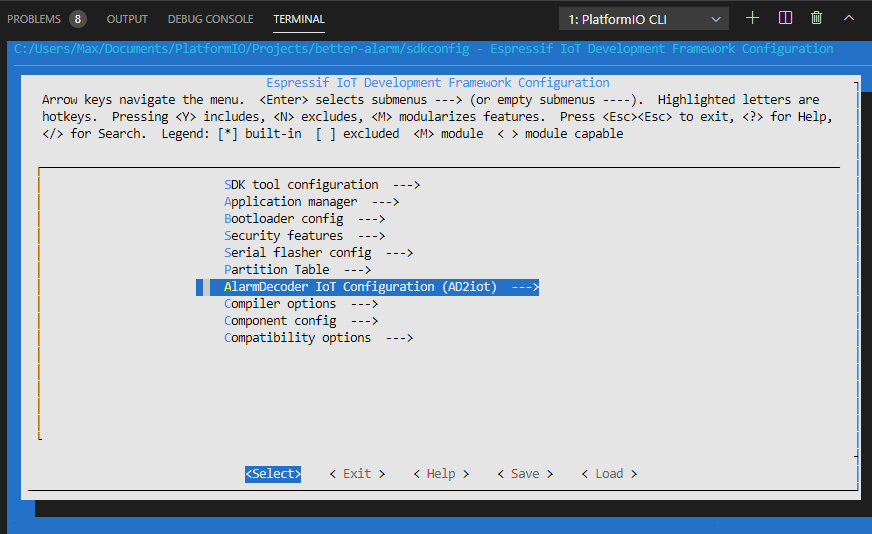Hi, first I just want to thank everyone for their work on PlatformIO. It’s a really great tool and I enjoy learning how to use it.
I’m trying to incorporate PlatformIO into a Samsung SmartThings project for a friend (link to source code). When I build the project with pio run, I get the following error message:
components/ser2sock/ser2sock.cpp:53:10: fatal error: alarmdecoder_main.h: No such file or directory
As you’ll see in the source code, that file exists in the include directory. I’m not very well-versed in building C++ projects. Does anyone know what may be causing this? It seems that it could be some sort of circular dependency since the libraries in lib_dir are including files from the include directory, though this could be totally incorrect.
platformio.ini
[platformio]
src_dir = main
lib_dir = components
[env:esp32dev]
platform = espressif32@1.12.4
board = esp32dev
framework = espidf
monitor_speed = 115200
Build Error
Processing esp32dev (platform: espressif32@1.12.4; board: esp32dev; framework: espidf)
----------------------------------------------------------------------------------------------------------------------
Verbose mode can be enabled via `-v, --verbose` option
CONFIGURATION: https://docs.platformio.org/page/boards/espressif32/esp32dev.html
PLATFORM: Espressif 32 (1.12.4) > Espressif ESP32 Dev Module
HARDWARE: ESP32 240MHz, 320KB RAM, 4MB Flash
DEBUG: Current (esp-prog) External (esp-prog, iot-bus-jtag, jlink, minimodule, olimex-arm-usb-ocd, olimex-arm-usb-ocd-h, olimex-arm-usb-tiny-h, olimex-jtag-tiny, tumpa)
PACKAGES:
- framework-espidf 3.40001.200521 (4.0.1)
- tool-cmake 3.16.4
- tool-esptoolpy 1.20600.0 (2.6.0)
- tool-ninja 1.7.1
- toolchain-esp32ulp 1.22851.191205 (2.28.51)
- toolchain-xtensa32 2.80200.200827 (8.2.0)
Reading CMake configuration...
LDF: Library Dependency Finder -> http://bit.ly/configure-pio-ldf
LDF Modes: Finder ~ chain, Compatibility ~ soft
Found 6 compatible libraries
Scanning dependencies...
Dependency Graph
|-- <otaupdate>
|-- <pushover>
|-- <ser2sock>
|-- <stsdk>
| |-- <otaupdate>
|-- <twilio>
|-- <alarmdecoder-api>
Building in release mode
Archiving .pio/build/esp32dev/bootloader/esp-idf/efuse/libefuse.a
Indexing .pio/build/esp32dev/bootloader/esp-idf/efuse/libefuse.a
Archiving .pio/build/esp32dev/bootloader/esp-idf/log/liblog.a
Indexing .pio/build/esp32dev/bootloader/esp-idf/log/liblog.a
Archiving .pio/build/esp32dev/bootloader/esp-idf/xtensa/libxtensa.a
Indexing .pio/build/esp32dev/bootloader/esp-idf/xtensa/libxtensa.a
Compiling .pio/build/esp32dev/lib94b/otaupdate/ota_util.o
components/otaupdate/ota_util.cpp:48:10: fatal error: alarmdecoder_main.h: No such file or directory
***************************************************************************
* Looking for alarmdecoder_main.h dependency? Check our library registry!
*
* CLI > platformio lib search "header:alarmdecoder_main.h"
* Web > https://platformio.org/lib/search?query=header:alarmdecoder_main.h
*
***************************************************************************
#include "alarmdecoder_main.h"
^~~~~~~~~~~~~~~~~~~~~
compilation terminated.
Compiling .pio/build/esp32dev/lib866/pushover/pushover.o
Compiling .pio/build/esp32dev/lib342/ser2sock/ser2sock.o
components/pushover/pushover.cpp:54:10: fatal error: alarmdecoder_main.h: No such file or directory
***************************************************************************
* Looking for alarmdecoder_main.h dependency? Check our library registry!
*
* CLI > platformio lib search "header:alarmdecoder_main.h"
* Web > https://platformio.org/lib/search?query=header:alarmdecoder_main.h
*
***************************************************************************
#include "alarmdecoder_main.h"
^~~~~~~~~~~~~~~~~~~~~
compilation terminated.
Compiling .pio/build/esp32dev/lib50f/stsdk/caps_battery.o
Compiling .pio/build/esp32dev/lib50f/stsdk/caps_button.o
*** [.pio/build/esp32dev/lib94b/otaupdate/ota_util.o] Error 1
*** [.pio/build/esp32dev/lib866/pushover/pushover.o] Error 1
components/ser2sock/ser2sock.cpp:53:10: fatal error: alarmdecoder_main.h: No such file or directory
***************************************************************************
* Looking for alarmdecoder_main.h dependency? Check our library registry!
*
* CLI > platformio lib search "header:alarmdecoder_main.h"
* Web > https://platformio.org/lib/search?query=header:alarmdecoder_main.h
*
***************************************************************************
#include "alarmdecoder_main.h"
^~~~~~~~~~~~~~~~~~~~~
compilation terminated.
*** [.pio/build/esp32dev/lib342/ser2sock/ser2sock.o] Error 1
============================================= [FAILED] Took 7.09 seconds =============================================
The terminal process "platformio 'run'" terminated with exit code: 1.
Terminal will be reused by tasks, press any key to close it.

